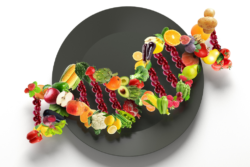When you think of vitamin A, hormones aren’t necessarily the first indication that comes to mind. While it’s well known for its impact on immunity and eye health, vitamin A does much more. It binds the retinoid X nuclear receptors (RXR), which is responsible for the expression of hundreds of genes that influence hormone metabolism, cellular differentiation and reproduction.
The gene, BCMO1 (beta-carotene monooxygenase) is responsible for the conversion of beta-carotene into retinol, the active form of vitamin A. Genetic variations in the BCMO1 gene can reduce the enzyme function by up to 69%, leading to 240% higher levels of beta-carotene in the blood. 1 Presumably decreasing cellular concentrations and bioavailability of retinol.
What this means is that, clinically, high beta-carotene levels are linked to hypothyroidism and amenorrhea (lack of period), indicating its influence on thyroid and reproductive hormones.
Vitamin A and Thyroid
The thyroid hormone, Thyroxine, increases the conversion of beta-carotene to vitamin A (retinol). Hyper-beta-carotenemia is often seen in those with hypothyroidism (low thyroid). Studies show serum beta-carotene levels are significantly higher in hypothyroidism, while lower in hyperthyroidism (excess thyroid). 5
- Retinol binds to and modulates the thyroid hormone receptor (TR) 2
- Animal studies show vitamin A deficient diets result in higher levels of free T4, pituitary TSH and hypothalamic TRH versus controls, while vitamin A supplementation increases hepatic T4 to T3 conversion. 2
- Patients with high TSH and low or normal fT4 (i.e., primary or subclinical hypothyroidism) show an increase in serum β-carotene levels versus healthy persons. 3
- In an RCT, 25,000IU of retinol per day for 4-months was shown to normalize TSH levels and increase free T34
Vitamin A is essential to a number of processes, including hormone regulation. While most of us are able to convert plant-based pro-vitamin A (beta-carotene) into active vitamin A, those with genetic predispositions are less efficient, meaning that they are susceptible to a vitamin A deficiency. This may be an underlying cause of poor thyroid function.
Vitamin A and Fertility
Retinol is important for oocyte development, fertilization, transport, uterine implantation, and fetal development. Interestingly, animal studies show that local intrafollicular carotenoid and retinoid concentrations are dependent on BCMO1 catalytic activity found within granulosa cells.6 In a study involving women with endometriosis undergoing IVF, a higher percentage of high-quality grade-1 embryos and mature oocytes were derived from follicles in the group with the highest tertial concentration of all-trans retinoic acid (ATRA).7
In women who are poor converters of BC to retinol, it is important to provide dietary sources of retinol and reduce the overconsumption of beta-carotene-rich foods. Studies show that in those with low BCMO1 activity, high consumption of beta-carotene-rich foods shuts down intestinal BCMO1 activity, leading to retinol deficiency.
For those that are prone to vitamin A deficiency due to genetic predispositions, it is important to get vitamin A from animal sources and check your vitamin A levels. High levels of beta-carotene or low levels of vitamin A affect the chances of getting pregnant.
Follow up labs
- Retinol
- Beta-carotene
Treatment
The following strategies have been shown to improve beta-carotene absorption and BCMO1 activity
- Increase protein consumption to 40% of total caloric intake
- Avoid gluten
- Avoid additives (MSG)
- Reduce beta-carotene rich foods and increase dietary retinol
- Retinol supplementation
If you have any questions, please contact Conceive Health today at info@conceivehealth.com
References:
- Leung WC, Hessel S, Méplan C, et al. Two common single nucleotide polymorphisms in the gene encoding β-carotene 15,15′-monoxygenase alter β-carotene metabolism in female volunteers. FASEB J. 2009;23(4):1041-1053. doi:10.1096/fj.08-121962
- Beck-Peccoz P, ed. Syndromes of Hormone Resistance on the Hypothalamic-Pituitary-Thyroid Axis. Vol 22. Springer US; 2004. doi:10.1007/978-1-4020-7852-1
- Kiuchi S, Ihara H, Koyasu M, et al. Relation between serum levels of thyroid hormone and serum β-carotene concentrations in patients with thyroid disorders. 2018;6(1):9.
- Farhangi MA, Keshavarz SA, Eshraghian M, Ostadrahimi A, Saboor-Yaraghi AA. The effect of vitamin A supplementation on thyroid function in premenopausal women. J Am Coll Nutr. 2012;31(4):268-274.
- Aktuna D, Buchinger W, Langsteger W, et al. [Beta-carotene, vitamin A and carrier proteins in thyroid diseases]. Acta Med Austriaca. 1993;20(1-2):17-20.
- Murphy R, Malone T. The effect of BCMO1 genetic polymorphisms on conversion of β-carotene to retinol and association to poor oocyte maturation. Intern Med Rev. doi:http://dx.doi.org/10.18103/imr.v3i12.632
- Pauli SA, Session DR, Shang W, et al. Analysis of Follicular Fluid Retinoids in Women Undergoing In Vitro Fertilization. Reprod Sci. 2013;20(9):1116-1124. doi:10.1177/1933719113477487



